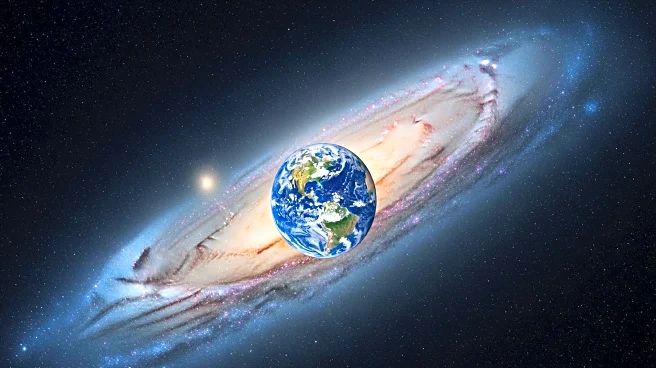What is the story about?
What's Happening?
Recent research has suggested that Earth's passage through the spiral arms of the Milky Way galaxy may have significant geological impacts. Scientists Chris Kirkland from Curtin University and Phil Sutton from the University of Lincoln have utilized data on neutral hydrogen to map the galaxy's density variations over time. By aligning this data with zircon isotope records, they have found correlations between these galactic crossings and changes in Earth's crustal dynamics. The study indicates that gravitational perturbations during these crossings could affect celestial bodies within the Solar System, potentially leading to increased activity in regions like the Oort Cloud and influencing Earth's geological history.
Why It's Important?
This research highlights the potential influence of cosmic phenomena on Earth's geological history, suggesting that external cosmic forces may play a role in shaping terrestrial events. The findings could have implications for understanding the broader dynamics of Earth's geological processes and the potential risks posed by cosmic events. While the correlation between galactic arm crossings and zircon isotope variability is evident, establishing a direct causal link remains a challenge. This study opens new avenues for exploring the complex interactions between cosmic and terrestrial forces, which could lead to a deeper understanding of Earth's geological past and future.
What's Next?
Further research is needed to establish a definitive causal relationship between galactic arm crossings and geological changes on Earth. Scientists will continue to investigate the potential mechanisms through which cosmic forces could influence terrestrial processes. This may involve more detailed studies of zircon crystals and other geological records, as well as advanced modeling of cosmic interactions. The findings could also prompt a reevaluation of current geological models to incorporate the potential impact of cosmic events.
Beyond the Headlines
The study raises intriguing questions about the interconnectedness of cosmic and terrestrial phenomena. It challenges traditional views of Earth's geological history by suggesting that external cosmic forces may have played a significant role. This could lead to a paradigm shift in how scientists understand the Earth's geological processes and the potential risks posed by cosmic events. The research also underscores the importance of interdisciplinary approaches in studying complex natural phenomena.















